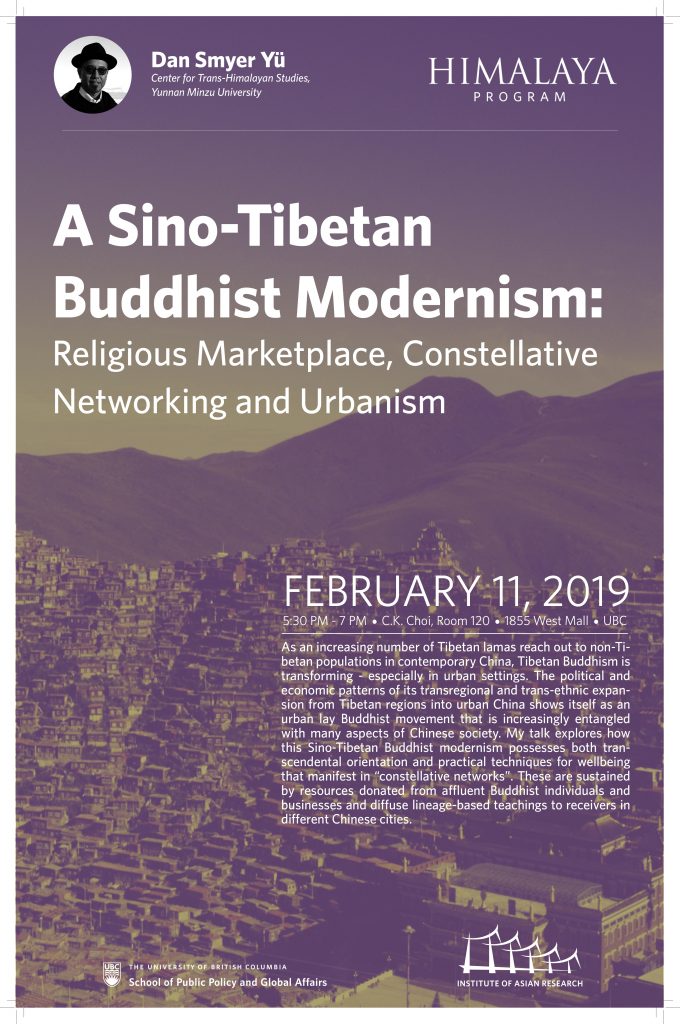Abstract
As an increasing number of Tibetan lamas reach out to non-Tibetan populations in contemporary China, Tibetan Buddhism is undergoing various transformations especially in urban settings. As its engagement with many aspects of the Chinese society, such as higher education, social morality, philanthropy, environmental conservation, and modern science, the pattern of its transregional and trans-ethnic expansion shows itself as an urban lay Buddhist movement. Based on the speaker’s ethnographic work, this talk discusses how the politics, economics, and practices of Tibetan Buddhism are deeply entangled with each other in contemporary Chinese society. Situated in this sociopolitical context, this talk, by treating Tibetan Buddhism as a world religion, argues that a Sino-Tibetan Buddhist modernism emerges in urban China as a Buddhist urbanism possessing both transcendental orientation and worldly function regarding the Buddhist sense of enlightenment and practical techniques for human worldly wellbeing under the fast changing, precarious conditions of livelihood making in contemporary China. The organizational manifestation of this Sino-Tibetan Buddhist modernism is what the spaker calls the “constellative networks,” which, sustained by material resources donated from affluent Buddhist individuals and businesses, diffuse the lineage-based Buddhist teachings from Tibetan regions to its receivers in different cities of China.
About the Speaker
Dan Smyer Yü is Professor and Founding Director of Center for Trans-Himalayan Studies at Yunnan Minzu University. He received his Ph.D. in anthropology from the University of California at Davis in 2006 and Master’s degrees in theology and anthropology respectively from San Francisco Theological Seminary (Graduate Theological Union) in 1995 and California State University East Bay in 2000. Prior to his current faculty appointment, he was a Research Group Leader at the Max Planck Institute for the Study of Religious and Ethnic Diversity, a core member of the Transregional Research Network (CETREN) at University of Göttingen, and a New Millennium Scholar at Minzu University of China, Beijing. His teaching and research are characteristically interdisciplinary, uniting cultural anthropology with religious studies, sociology, ecology, cultural geography, philosophy (phenomenology), and visual studies. He is the author of The Spread of Tibetan Buddhism in China: Charisma, Money, Enlightenment (Routledge 2011) and Mindscaping the Landscape of Tibet: Place, Memorability, Eco-aesthetics (De Gruyter 2015), and the co-editor of Religion and Ecological Sustainability in China (Routledge 2014) and Trans-Himalayan Borderlands: Livelihoods, Territorialities, Modernities (Amsterdam University Press 2017). He has also published numerous book chapters and peer-reviewed journal articles. His research interests are religion and ecology, environmental humanities, transboundary state effects, hydraulic politics, climate change and heritage preservation, Buddhism and peacebuilding, and comparative studies of Eurasian secularisms. His current externally funded projects are “India-China Corridor Project” (the Swedish Research Council), “Cultural and Ecological Diversity of the Trans-Himalayas in the Context of China’s Belt and Road Initiative” (National Social Sciences Foundation of China), and “The Price of Spice: Non-Timber Forest Products and Indigenous Minority Livelihoods in the Southeast Asian Massif” (SSHRC Partnership Development Grant). Presently he is preparing to write up a new monograph – Territorial Charisma: Authority, Indigeneity, and Rhizomic Ethics of the Earth (working title).
